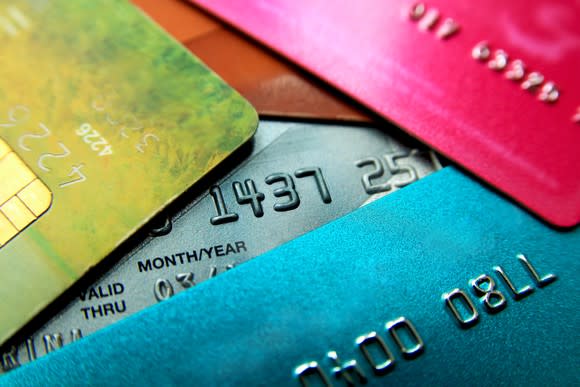Watch Out for This Clever Credit Card Scam
While many people regularly check their credit card bills to make sure that all the charges are correct, others can be lax when it comes to looking over their monthly statements. In addition, since many people pay off their credit cards via an automatic transfer, it's easy for small mistakes to slip through.
Perhaps that's not a big deal if it's a one-time mistake -- maybe a restaurant misreading your handwriting. Not checking your credit card bill, however, could potentially let something more nefarious slip through: small charges for subscriptions that recur each month.

Vigilance can protect you from credit card scams. Image source: Getty Images.
What's happening?
If someone steals your credit card number and runs up a huge bill quickly, it will be obvious to you as well as your credit card provider. That still happens, of course, but some thieves are going for a more subtle approach. They obtain access to a stolen credit card number and use it to create accounts at Spotify, Hulu, Netflix, and other similar services.
These charges are less likely to be noticed by the cardholder. In some cases, they're not paying attention and in others, they may also be a customer of the service, paid for on another card or via another method.
If you have a Spotify subscription and see a charge from the music service on your credit card, it's easy to overlook and for the criminal to get a long-term free ride. That's bad, but it's not the worst thing that can happen, according to ACI Worldwide Senior Fraud Consultant Seth Ruden.
"It's not uncommon for fraudsters to use subscription merchants for testing cards with small transactions before the real high-dollar fraud takes place," he wrote in an email to The Motley Fool. "The cost to use one of these inexpensive merchants doesn't eat into available funds on the card and isn't expected to set off alarms when attempted if the merchant is familiar to the user."
Ruden, who has worked with banks and law enforcement to detect and mitigate financial and cyber-crimes since 2004, also shared some variants of this scam to watch out for. He explained that there are markets where hackers can sell working accounts at services like the ones named above.
"Subscription merchants take many forms, including digital content delivery," he wrote."The likelihood of the merchant being attacked is usually a factor of their product's liquidity, either for sale on a secondary market, or into a different payment channel, like a prepaid debit card. Many stored value products can be resold on secondary markets, online auctions, or P2P exchanges."
What can you do?
Check your credit card bill frequently and be skeptical. Even if you see a charge for a service, product, or website you use, make sure that the cost is correct and that the card you're looking at is the one used to pay that bill.
This is a small-time scam that can either pave the way for a big purchase on your card or slowly add up to a lot of money. The easiest way to fix this is to be vigilant. Make checking your credit card statement something you do often -- at least once a week -- and if you see something, alert your card company.
In most cases, you can do this in your credit card provider's app on your smartphone. Most companies even allow you to report fraudulent or questionable charges right from the app or website.
Having to get a new credit card is a hassle, but it's less of a problem than noticing fraud months later or after it becomes a major charge. A little vigilance goes a long way toward keeping these issues small and stopping them quickly.
More From The Motley Fool
Daniel B. Kline has no position in any of the stocks mentioned. The Motley Fool owns shares of and recommends Netflix. The Motley Fool has a disclosure policy.

 Yahoo Finance
Yahoo Finance 